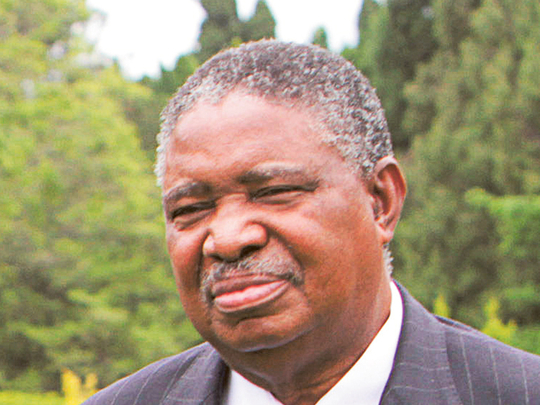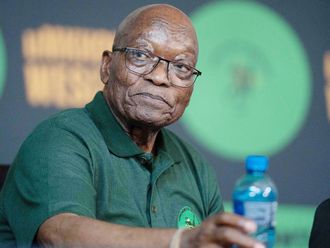
Harare, Zimbabwe: The country’s ATMs have run out of cash. Even the police and the army — linchpins of the government’s control — are not getting paid on time.
But as economic protests have multiplied and shut down the capital recently, Vice President Phelekezela Mphoko has enjoyed a special privilege, courtesy of the state: nearly 600 nights in the presidential suite of Zimbabwe’s most luxurious hotel while his official mansion is being prepared.
The vice president’s extended stay in the Rainbow Towers presidential suite — he checked into the hotel in December 2014, at a taxpayer cost of $1,000 (Dh3,670) a night, including meals — has drawn regular demonstrations outside the five-star landmark, where visiting dignitaries stay.
But Mphoko and his wife, Laurinda, would not move out, local news reports said, because they kept rejecting official residences as inadequate, too small or too close to the homes of other government ministers.
“This hotel is going to break,” Sten Zvorwadza warned last month as he and other demonstrators took over the lobby, threatening to shut down the hotel unless Mphoko checked out.
“Gentlemen, gentlemen!” Zvorwadza continued as police surrounded him, lifting him in the air and then dragging him across the marble floor.
Now, after hundreds of thousands of dollars in hotel bills, Mphoko’s stay could finally be coming to an end. A local newspaper has reported that Mphoko is moving to a $2 million mansion in a neighbourhood called Highlands. Residents there said that they, too, had heard of the vice president’s impending arrival and pointed to the recent, unexpected filling of potholes on their street as credible evidence.
Mphoko has not commented on his plans. The minister of state in the vice president’s office, reached on her cell phone, hung up.
“If he’s leaving the hotel, the country needs to know,” said Zvorwadza, the leader of the protesters who have held demonstrations outside the hotel since last December. “This is the syndrome we are fighting. A public figure must be accountable to his citizens.”
The unconfirmed move — a similar report said that the vice president was bound for a $4 million mansion late last year — could bring some relief to the government of President Robert Mugabe, who is facing an unusually broad challenge to the nation’s crumbling economy.
The government is struggling to pay its workers, and for the past two months it has fallen behind on salaries for the army and the police, Mugabe’s core supporters. Much of the capital, Harare, and other cities ground to a halt this month as Zimbabweans stayed home to protest the deteriorating economy. It was one of the biggest popular protests in years against the 92-year-old Mugabe, whose increasing frailty has fuelled political infighting and instability in this Southern African nation.
Given the dire conditions, the vice president’s stay in the presidential suite has even raised eyebrows among the president’s traditional allies.
“It’s something unheard-of where a vice president can remain in a hotel for so long,” said Cephas Msipa, a retired politician who was a senior member of Mugabe’s party, known as Zanu-PF. “His behaviour is quite strange.”
Responding to local reports that the couple had turned down a $3 million mansion, the vice president sounded annoyed last month.
“People don’t know what they are talking about,” he told the state newspaper, The Herald. “The house that the government has bought me is not even worth $3 million. It’s $1 million and something.”
Mphoko, now 76, moved into the hotel right after being named one of Zimbabwe’s two vice presidents. A military leader during this country’s war of liberation, he served as an intelligence officer in several embassies after Zimbabwe’s independence in 1980, and eventually became ambassador to Botswana, Russia and South Africa. His family is a major shareholder in a supermarket chain called Choppies Zimbabwe, whose parent company’s headquarters are in Botswana.
Mphoko served as Choppies Zimbabwe’s chairman before becoming vice president. Activists protesting his stay at the hotel have also called for a boycott of Choppies.
“We run Choppies — it’s a people’s shop,” the vice president told the state-owned newspaper, The Herald, defending the supermarket chain. “Our low prices have forced every retailer to reduce theirs.”
Mphoko is from Bulawayo, Zimbabwe’s second-largest city, and does not own a home in Harare, so bureaucrats presented the couple with real estate options. But Mphoko rejected a house previously occupied by a predecessor (“His wife allegedly vehemently refused,” according to one local news report) and other mansions in the capital’s richest neighbourhoods.
In the Highlands neighbourhood last week, a police officer stood watch before a large house identified as the vice president’s future official residence. Workers could be seen carrying out renovations behind a high, concrete wall and tall pine trees.
But even in the Highlands, the capital’s budgetary problems were visible on the streets. The road leading to the house was dotted with potholes. Fraying of the paved surface made it difficult for two large vehicles to drive past each other. Workers were filling potholes and resurfacing parts of the road.
“Thanks to the vice president for choosing to come and live in our area, our road has received a facelift,” said a resident of the block, Mike Kanduri, who was standing outside the gate of his home. “We pray he would come and truly live at the house.”












